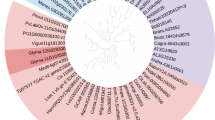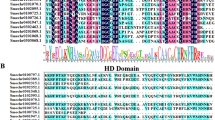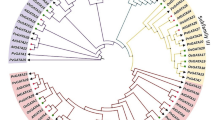Abstract
Main conclusion
The function of the first MADS-box transcription factor from endosperm of coconut, CnMADS1, was characterized via seed-specific overexpression in Arabidopsis seeds and further confirmed in protoplasts of coconut.
Abstract
Coconut (Cocos nucifera L.), which belongs to the palm family (Arecaceae), is one of the world’s most useful economical tropical crops. However, few genes related to coconut endosperm development have been studied. In previous research, an AGAMOUS-like (AGL) MADS-box transcription factor, named CnMADS1, was identified in the endosperm of coconut through the SSH cDNA library. In this paper, functional characterization of the CnMADS1 gene was carried out by seed-specific overexpression in A. thaliana seeds and protoplasts of coconut. The results indicated that in the twelve independent T2 transgenic Arabidopsis lines with high overexpression of CnMADS1, the size of the mature seeds of transgenic plants was increased significantly (19.64% increase in the long axis and 8.6% increase in the short axis) compared to that of the wild-type seeds. Moreover, the total lipid content also increased significantly in mature seeds of transgenic plants. After comparing the expression of related genes in wild-type and transgenic plants and confirmation by EMSA, AtOSR1, a regulatory gene related to seed size, was proven to be significantly up-regulated by CnMADS1 in transgenic plants. Moreover, the transient transformation of protoplasts of coconut also proved that CnLECRK3 (the homologous gene of AtOSR1 in coconut) is up-regulated by the CnMADS1 gene in the same way. All these results indicated that a similar regulation mode existed in Arabidopsis and the endosperm of coconut and ultimately affected the yield and quality of coconut copra.









Similar content being viewed by others

References
Becker A, Theissen G (2003) The major clades of MADS-box genes and their role in the development and evolution of flowering plants. Mol Phylogenet Evol 29(3):464–489. https://doi.org/10.1016/s1055-7903(03)00207-0
Chen C, Begcy K, Liu K, Folsom JJ, Wang Z, Zhang C, Walia H (2016) Heat stress yields a unique MADS box transcription factor in determining seed size and thermal sensitivity. Plant Physiol 171(1):606–622. https://doi.org/10.1104/pp.15.01992
Cutter VM Jr, Wilson KS, Dube GR (1952) The isolation of living nuclei from the endosperm of Cocos nucifera. Science 115(2977):58–59. https://doi.org/10.1126/science.115.2977.58
Cutter VM, Wilson KS, Freeman B (1955) Nuclear behavior and cell formation in the developing endosperm of Cocos nucifera. Am J Bot 42(2):7
Dasanayaka PN, Everard JMDT, Karunanayaka EH, Nandadasa HG (2009) Analysis of coconut (Cocos nucifera L.) diversity using microsatellite markers with emphasis on management and utilisation of genetic resources. J Natl Sci Found Sri 37(2):99–109
Dreni L, Kater MM (2014) MADS reloaded: evolution of the AGAMOUS subfamily genes. N Phytol 201(3):717–732. https://doi.org/10.1111/nph.12555
Dutt M (1953) Dividing nuclei in coconut milk. Nature 171(4357):799–800. https://doi.org/10.1038/172799a0
Ehlers K, Bhide AS, Tekleyohans DG, Wittkop B, Snowdon RJ, Becker A (2016) The MADS box genes ABS, SHP1, and SHP2 Are essential for the coordination of cell divisions in ovule and seed coat development and for endosperm formation in Arabidopsis thaliana. PLoS ONE 11(10):e0165075. https://doi.org/10.1371/journal.pone.0165075
Elitzur T, Vrebalov J, Giovannoni JJ, Goldschmidt EE, Friedman H (2010) The regulation of MADS-box gene expression during ripening of banana and their regulatory interaction with ethylene. J Exp Bot 61(5):1523–1535. https://doi.org/10.1093/jxb/erq017
Feng G, Qin Z, Yan J, Zhang X, Hu Y (2011) Arabidopsis ORGAN SIZE RELATED1 regulates organ growth and final organ size in orchestration with ARGOS and ARL. N Phytol 191(3):635–646. https://doi.org/10.1111/j.1469-8137.2011.03710.x
Gunn BF, Baudouin L, Olsen KM (2011) Independent origins of cultivated coconut (Cocos nucifera L.) in the old world tropics. PLoS ONE. https://doi.org/10.1371/journal.pone.0021143
Guo X, Chen G, Naeem M, Yu X, Tang B, Li A, Hu Z (2017) The MADS-box gene SlMBP11 regulates plant architecture and affects reproductive development in tomato plants. Plant Sci 258:90–101. https://doi.org/10.1016/j.plantsci.2017.02.005
Harris M, Fryda L, Hutchins A (2015) The impact of coconut and safflower oils on body composition. Faseb J 29:747
Hu Y, Xie Q, Chua NH (2003) The Arabidopsis auxin-inducible gene ARGOS controls lateral organ size. Plant Cell 15(9):1951–1961. https://doi.org/10.1105/tpc.013557
Hu Y, Poh HM, Chua NH (2006) The Arabidopsis ARGOS-LIKE gene regulates cell expansion during organ growth. Plant J 47(1):1–9. https://doi.org/10.1111/j.1365-313X.2006.02750.x
Hu Y, Zhou L, Huang M, He X, Yang Y, Liu X, Li Y, Hou X (2018) Gibberellins play an essential role in late embryogenesis of Arabidopsis. Nat Plants 4(5):289–298. https://doi.org/10.1038/s41477-018-0143-8
Jin YH, Yuan YJ, Gao LC, Sun RH, Chen LZ, Li DD, Zheng YS (2017) Characterization and functional analysis of a type 2 diacylglycerol acyltransferase (DGAT2) gene from oil palm (Elaeis guineensis Jacq.) mesocarp in Saccharomyces cerevisiae and transgenic Arabidopsis thaliana. Front Plant Sci. https://doi.org/10.3389/fpls.2017.01791
Knutzon DS, Lardizabal KD, Nelsen JS, Bleibaum JL, Davies HM, Metz JG (1995) Cloning of a coconut endosperm cDNA encoding a 1-acyl-sn-glycerol-3-phosphate acyltransferase that accepts medium-chain-length substrates. Plant Physiol 109(3):999–1006. https://doi.org/10.1104/pp.109.3.999
Laureles LR, Rodriguez FM, Reano CE, Santos GA, Laurena AC, Mendoza EM (2002) Variability in fatty acid and triacylglycerol composition of the oil of coconut (Cocos nucifera L.) hybrids and their parentals. J Agric Food Chem 50(6):1581–1586. https://doi.org/10.1021/jf010832w
Li DD, Fan YM (2008) Construction and characterization of a cDNA library from the pulp of coconut (Cocos nucifera L.). Agric Sci China 7(9):1071–1076
Li S, Chen K, Grierson D (2019) A critical evaluation of the role of ethylene and MADS transcription factors in the network controlling fleshy fruit ripening. N Phytol 221(4):1724–1741. https://doi.org/10.1111/nph.15545
Liang YX, Yuan YJ, Liu T, Mao W, Zheng YS, Li DD (2014) Identification and computational annotation of genes differentially expressed in pulp development of Cocos nucifera L. by suppression subtractive hybridization. BMC Plant Biol 14:205
Liu J, Zhang J, Zhang J, Miao H, Wang J, Gao P, Hu W, Jia C, Wang Z, Xu B, Jin Z (2017) Genome-wide analysis of banana MADS-box family closely related to fruit development and ripening. Sci Rep 7(1):3467. https://doi.org/10.1038/s41598-017-03897-1
Luo M, Dennis ES, Berger F, Peacock WJ, Chaudhury A (2005) MINISEED3 (MINI3), a WRKY family gene, and HAIKU2 (IKU2), a leucine-rich repeat (LRR) KINASE gene, are regulators of seed size in Arabidopsis. Proc Natl Acad Sci USA 102(48):17531–17536. https://doi.org/10.1073/pnas.0508418102
Luo J, Zhou JJ, Zhang JZ (2018) Aux/IAA gene family in plants: molecular structure, regulation, and function. Int J Mol Sci. https://doi.org/10.3390/ijms19010259
Nayar S, Kapoor M, Kapoor S (2014) Post-translational regulation of rice MADS29 function: homodimerization or binary interactions with other seed-expressed MADS proteins modulate its translocation into the nucleus. J Exp Bot 65(18):5339–5350. https://doi.org/10.1093/jxb/eru296
Nejat N, Cahill DM, Vadamalai G, Ziemann M, Rookes J, Naderali N (2015) Transcriptomics-based analysis using RNA-Seq of the coconut (Cocos nucifera) leaf in response to yellow decline phytoplasma infection. Mol Genet Genom 290(5):1899–1910. https://doi.org/10.1007/s00438-015-1046-2
Qin Z, Zhang X, Zhang X, Feng G, Hu Y (2014) The Arabidopsis ORGAN SIZE RELATED 2 is involved in regulation of cell expansion during organ growth. BMC Plant Biol 14:349. https://doi.org/10.1186/s12870-014-0349-5
Rivera R, Edwards KJ, Barker JH, Arnold GM, Ayad G, Hodgkin T, Karp A (1999) Isolation and characterization of polymorphic microsatellites in Cocos nucifera L. Genome 42(4):668–675
Sandoval-Cancino G, Sáenz L, Chan JL, Oropeza C (2016) Improved formation of embryogenic callus from coconut immature inflorescence explants. Vitro Cell Dev Biol Plant 52(4):367–378. https://doi.org/10.1007/s11627-016-9780-7
Shan H, Zahn L, Guindon S, Wall PK, Kong H, Ma H, DePamphilis CW, Leebens-Mack J (2009) Evolution of plant MADS box transcription factors: evidence for shifts in selection associated with early angiosperm diversification and concerted gene duplications. Mol Biol Evol 26(10):2229–2244. https://doi.org/10.1093/molbev/msp129
Smaczniak C, Immink RG, Angenent GC, Kaufmann K (2012) Developmental and evolutionary diversity of plant MADS-domain factors: insights from recent studies. Development 139(17):3081–3098. https://doi.org/10.1242/dev.074674
Sun R, Ye R, Gao L, Zhang L, Wang R, Mao T, Zheng Y, Li D, Lin Y (2017a) Characterization and ectopic expression of CoWRI1, an AP2/EREBP domain-containing transcription factor from coconut (Cocos nucifera L) endosperm, changes the seeds oil content in transgenic Arabidopsis thaliana and rice (Oryza sativa L). Front Plant Sci 8:63. https://doi.org/10.3389/fpls.2017.00063
Sun RH, Ye RJ, Gao LC, Zhang L, Wang R, Mao T, Zheng YS, Li DD, Lin YJ (2017b) Characterization and ectopic expression of CoWRI1, an AP2/EREBP domain-containing transcription factor from coconut (Cocos nucifera L.) endosperm, changes the seeds oil content in transgenic Arabidopsis thaliana and rice (Oryza sativa L.). Front Plant Sci 5:10. https://doi.org/10.3389/fpls.2017.00063
Tamura K, Dudley J, Nei M, Kumar S (2007) MEGA4: molecular evolutionary genetics analysis (MEGA) software version 4.0. Mol Biol Evol 24(8):1596–1599. https://doi.org/10.1093/molbev/msm092
Tranbarger TJ, Dussert S, Joet T, Argout X, Summo M, Champion A, Cros D, Omore A, Nouy B, Morcillo F (2011) Regulatory mechanisms underlying oil palm fruit mesocarp maturation, ripening, and functional specialization in lipid and carotenoid metabolism. Plant Physiol 156(2):564–584. https://doi.org/10.1104/pp.111.175141
van der Linden CG, Vosman B, Smulders MJ (2002) Cloning and characterization of four apple MADS box genes isolated from vegetative tissue. J Exp Bot 53(371):1025–1036. https://doi.org/10.1093/jexbot/53.371.1025
Weigel D (1995) The APETALA2 domain is related to a novel type of DNA binding domain. Plant Cell 7(4):388–389. https://doi.org/10.1105/tpc.7.4.388
Yamaguchi T, Hirano HY (2006) Function and diversification of MADS-box genes in rice. ScientificWorldJournal 6:1923–1932. https://doi.org/10.1100/tsw.2006.320
Yamaguchi T, Lee DY, Miyao A, Hirochika H, An G, Hirano HY (2006) Functional diversification of the two C-class MADS box genes OSMADS3 and OSMADS58 in Oryza sativa. Plant Cell 18(1):15–28. https://doi.org/10.1105/tpc.105.037200
Yuan YJ, Liang YX, Li BZ, Zheng YS, Luo XQ, Li DD (2015) Cloning and function characterization of a beta-Ketoacyl-acyl-ACP synthase I from coconut (Cocos nucifera L.) endosperm. Plant Mol Biol Rep 33(4):1131–1140. https://doi.org/10.1007/s11105-014-0816-z
Yuan YJ, Gao LC, Sun RH, Yu T, Liang YX, Li DD, Zheng YS (2017) Seed-specific expression of an acyl-acyl carrier protein thioesterase CnFatB3 from coconut (Cocos nucifera L.) increases the accumulation of medium-chain fatty acids in transgenic Arabidopsis seeds. Sci Hortic-Amsterdam 223:5–9. https://doi.org/10.1016/j.scienta.2017.05.029
Zhang J, Nallamilli BR, Mujahid H, Peng Z (2010) OsMADS6 plays an essential role in endosperm nutrient accumulation and is subject to epigenetic regulation in rice (Oryza sativa). Plant J 64(4):604–617. https://doi.org/10.1111/j.1365-313X.2010.04354.x
Zhang X, Hirsch CN, Sekhon RS, de Leon N, Kaeppler SM (2016) Evidence for maternal control of seed size in maize from phenotypic and transcriptional analysis. J Exp Bot 67(6):1907–1917. https://doi.org/10.1093/jxb/erw006
Zheng Y, Jin Y, Yuan Y, Feng D, Chen L, Li D, Zhou P (2019) Identification and function analysis of a type 2 diacylglycerol acyltransferase (DGAT2) from the endosperm of coconut (Cocos nucifera L.). Gene 702:75–82. https://doi.org/10.1016/j.gene.2019.03.060
Acknowledgements
This research was supported by the Hainan Provincial Natural Science Foundation of China (No. 2019CXTD397), the National Natural Science Foundation of China (NSFC) (No. 31660222) and National Key R&D Program of China, 2018YFD1000500.
Author information
Authors and Affiliations
Corresponding author
Ethics declarations
Conflict of interest
The authors declare that they have no conflict of interest.
Additional information
Communicated by Anastasios Melis.
Publisher's Note
Springer Nature remains neutral with regard to jurisdictional claims in published maps and institutional affiliations.
Electronic supplementary material
Below is the link to the electronic supplementary material.
Rights and permissions
About this article
Cite this article
Sun, R., Gao, L., Mi, Z. et al. CnMADS1, a MADS transcription factor, positively modulates cell proliferation and lipid metabolism in the endosperm of coconut (Cocos nucifera L.). Planta 252, 83 (2020). https://doi.org/10.1007/s00425-020-03490-3
Received:
Accepted:
Published:
DOI: https://doi.org/10.1007/s00425-020-03490-3



